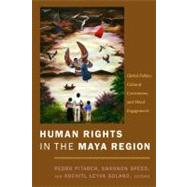- ISBN: 9780822343134 | 0822343134
- Cover: Paperback
- Copyright: 12/1/2008
In recent years Latin American indigenous groups have regularly deployed the discourse of human rights to legitimate their positions and pursue their goals. Perhaps nowhere is this more evident than in the Maya region of Chiapas and Guatemala, where in the last two decades indigenous social movements have been engaged in ongoing negotiations with the state, and the presence of multinational actors has brought human rights to increased prominence. In this volume, scholars and activists examine the role of human rights in the ways that states relate to their populations, analyze conceptualizations and appropriations of human rights by Mayans in specific localities, and explore the relationship between the individualist and "universal" tenets of Western-derived human rights concepts and various Mayan cultural understandings and political subjectivities.The collection includes a reflection on the effects of truth-finding and documenting particular human rights abuses, a look at how Catholic social teaching validates the human rights claims advanced by indigenous members of a diocese in Chiapas, and several analyses of the limitations of human rights frameworks. A Mayan intellectual seeks to bring Mayan culture into dialogue with western feminist notions of women's rights, while another contributor critiques the translation of the United Nations Declaration of Human Rights into Tzeltal, an indigenous language in Chiapas. Taken together, the essays reveal a broad array of rights-related practices and interpretations among the Mayan population, demonstrating that global-local-state interactions are complex and diverse even within a geographically limited area. So too are the goals of indigenous groups, which vary from social reconstruction and healing following years of violence to the creation of an indigenous autonomy that challenges the tenets of neoliberalism.Contributors: Robert M. Carmack; Stener Ekern; Xóchitl Leyva Solano; Julián López García; Christine Kovic; Irma Otzoy; Pedro Pitarch; Álvaro Reyes; Victoria Sanford; Rachel Sieder; Shannon Speed; Rodolfo Stavenhagen; David Stoll; Richard Ashby Wilson






